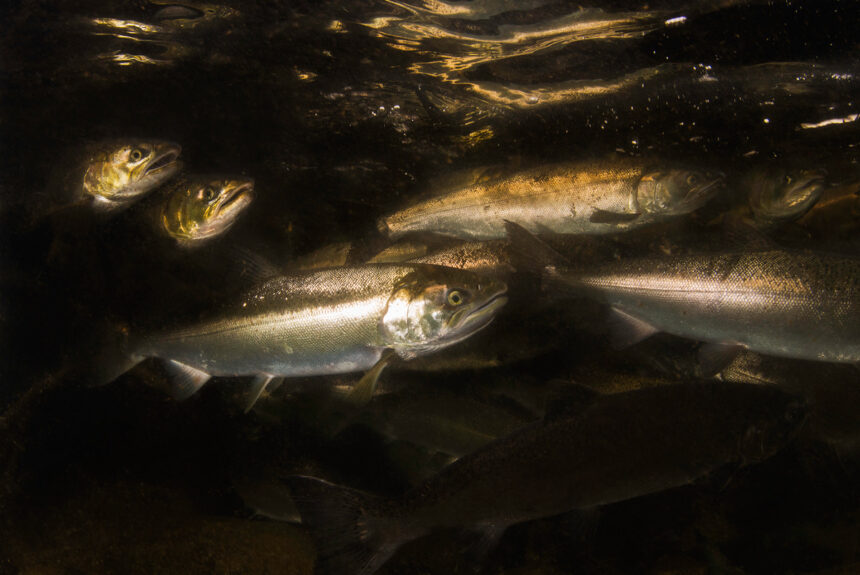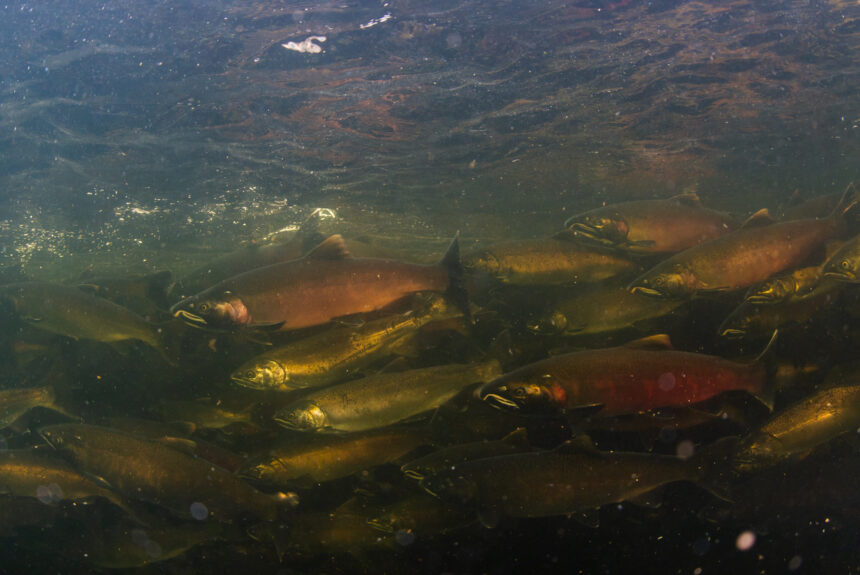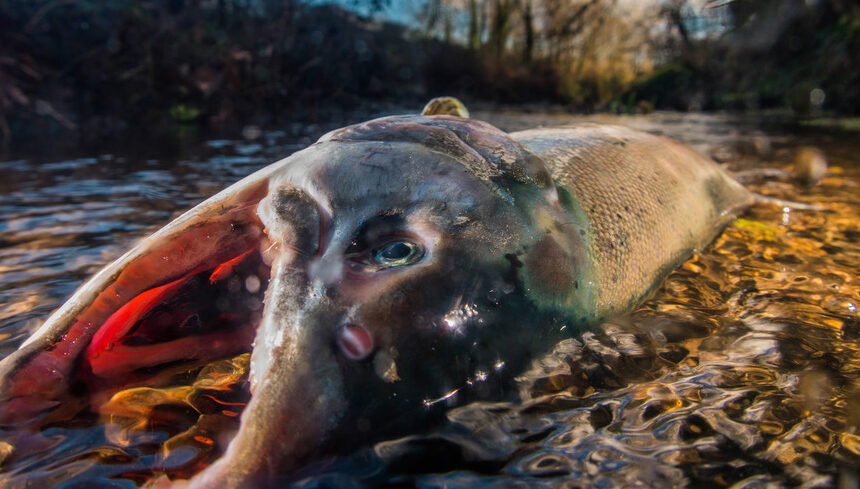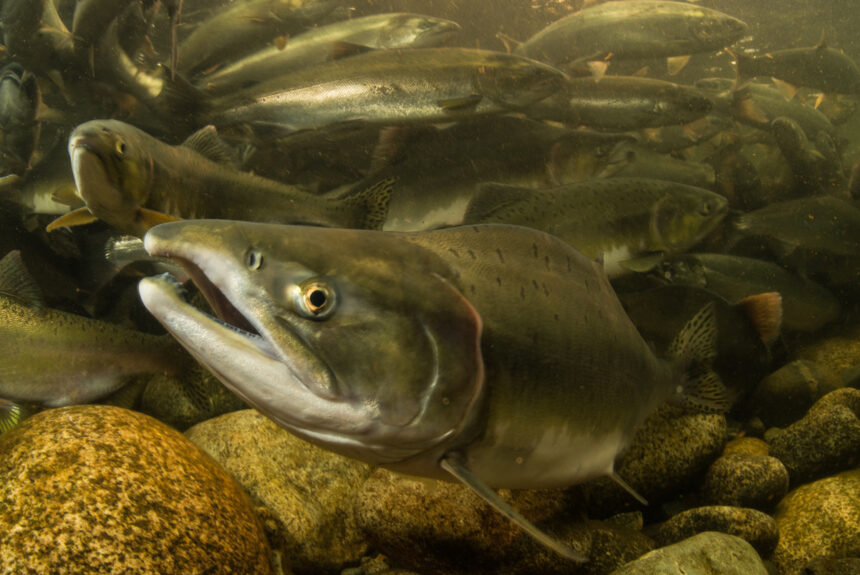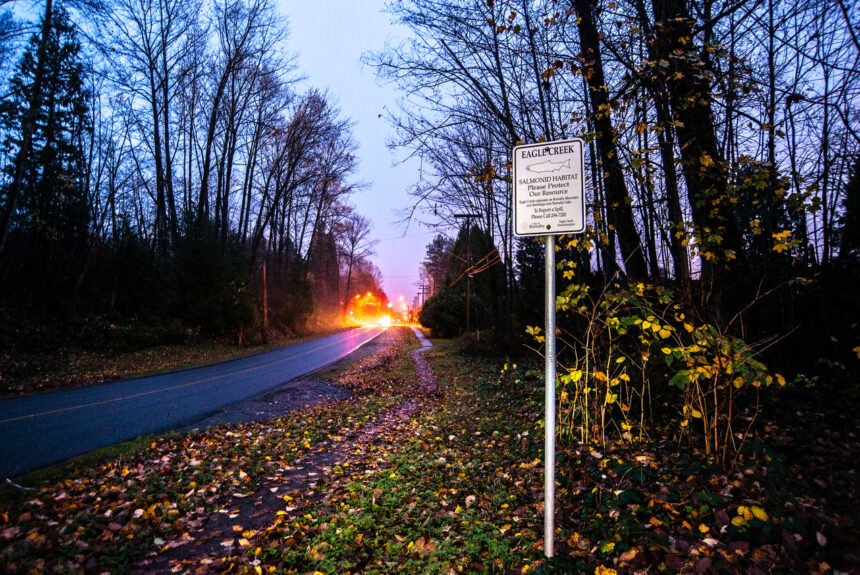These educational resources will help you navigate some of the issues facing wild salmon so that you can take meaningful action and spearhead social change in your local community.
Wild Salmon are keystone species of immeasurable ecosystem, spiritual and cultural importance. These species are the essential connector for people, animals, trees and the environment. As they provide food on our tables they are of great economic importance as well. Human activities and climate change per se are posing threats to our Pacific wild salmon. The specific species of wild salmon (chinook, sockeye, pink, coho, and chum) have been differentially affected, but all of them have shown dramatically diminished numbers leading to some of the lowest recorded levels in recent years. You can make a huge impact on tackling the issues surrounding declines in wild salmon populations, thus benefiting humans and the other ~250 species that rely upon wild salmon for their livelihood. At the same time, we make our communities a better place to live by honouring the homes and vitality of all inhabitants, not just humans.
Wild Salmon Youth Action Kit:
Wild Salmon Youth Conservation Kit
Urban Salmon Documentary:
This short film created by Fernando Lessa and supported by Take a Stand and Watershed Watch features the story of the fish in the Urban Environment. Once abundant, this amazing fish was almost extinguished from our cityscape. Inspired by the passion and dedication from Metro Vancouver Streamkeepers, the documentary tells the story of how our urban streams were restored and salmon brought back to our backyards.
Videos Featuring Salmon Experts & Stewards
Dr. Jonathan Moore, SFU Professor – holds the Liber Ero Research Chair of Coastal Science and Management. Jonathan received his PhD from University of Washington and has researched salmon and their watersheds, from Alaska to California to British Columbia. He studies freshwater biodiversity, watersheds, and global change, with particular focus on BC’s rivers and their salmon, and he has published over 100 papers on these topics. He works closely with a diverse array of collaborators and partner organizations to codevelop research and communicate their findings and thereby contribute to positive watershed change.
We asked Jonathan what inspires him most about wild salmon, the fascinating life history of these species, and the critical nature of biodiversity and genetic variation in wild salmon populations, particularly within the context of resilience to climate change.
Misty MacDuffee, Biologist and Program Director, Raincoast Conservation Foundation
Misty MacDuffee is a conservation biologist and Program Director at Raincoast Conservation Foundation with a focus on fisheries ecology in salmon ecosystems. For the past 15 years, she has undertaken various types of field, laboratory, technical and conservation assessments in the salmon-bearing watersheds of the BC coast. She has a particular interest in the role of salmon as critical food sources for wildlife and incorporating their needs into salmon management decisions. She is also interested in historic stock assessment and run reconstructions in salmon watersheds. The application of her work is to implement ecosystem considerations in fisheries management. This often requires her engagement with management, dialogue and stakeholder forums that affect fisheries and wildlife policy. She is knowledgeable on, and passionate about, addressing Chinook salmon population dynamics to help our endangered Southern Resident orcas.
We asked Misty about her passion for wild salmon conservation, the main issues threatening our Southern Resident orcas related to Chinook salmon, Raincoast’s restoration work within the Fraser River estuary, and the critical importance of implementing “salmon-first policies”.
Bob (Galagame’) Chamberlin, Indigenous Leader
Bob provided 14 years of tested and proven leadership as elected Chief Councillor for the Kwikwasutinuxw Haxwa’mis First Nation. He also successfully served as the Vice-President of the Union of BC Indian Chiefs for three consecutive three-year terms. A Consultant and Leader of the First Nations Wild Salmon Alliance, this work and his background has taken him across the country and the world advocating for human rights and environmental justice. He is particularly focused on housing, safe drinking water, the needs of children and families, and protecting our environment. He has tirelessly worked to remove fish farms from wild salmon migration routes and has been a champion of implementing the UN Declaration on the Rights of Indigenous People for the first time in Canada.
We asked Bob about why wild salmon is so important to First Nations, what protective measures and policy changes are needed to safeguard wild salmon, as well as what the public, community, and youth can do to help out.
David Scott, Salmon Restoration Coordinator (Raincoast) & Ph.D. Candidate
Dave Scott is a salmon biologist with a focus on understanding juvenile salmon life histories to facilitate better restoration planning. He is currently a PhD student in the Pacific Salmon Ecology and Conservation Laboratory at UBC where he studies under highly renowned salmon researcher Dr. Scott Hinch. Dave’s PhD research focuses on understanding juvenile Chinook estuary reliance through field research capturing out migrating juvenile salmon in the Fraser River estuary along with laboratory studies conducted at UBC. Dave also leads Raincoast’s Fraser Estuary Connectivity Project which has created three large breaches in the Steveston Jetty, reconnecting the river to its delta after over 100 years. As part of his research Dave also leads Raincoast’s effectiveness monitoring which has demonstrated the movement of juvenile salmon through the newly created breaches along with measuring changes in the distribution of freshwater and sediments and changes in vegetation.
We asked Dave about his research and estuary habitat restoration work and about the critical importance of this work – along with policy changes – to mitigating threats, restoring salmon migration pathways, and building resilience of wild salmon to climate change and sea level rise.
Norm Hann, Youth Educator and Expedition Leader
Norm Hann is a professional stand up paddleboarder who spends his time training, racing and, exploring remote locations on his SUP, while sharing the sport in Canada. Based in Squamish, BC, Norm runs his own expedition company which provides SUP training and multi-day SUP expeditions. A former successful school teacher in Ontario, Norm has worked in BC in the Great Bear Rainforest for more than 20 years as an outdoor guide, teacher and expedition leader. Norm has a special relationship with the community of Hartley Bay where he has been adopted into the Gitga’at First Nation and given the name T’aam Laan, which means “Steersman of the Canoe”. Through the International award-winning documentary film STAND (now available on Vimeo on demand), the Take a Stand program, and his Standup4Greatbear Society, Norm has brought awareness and fought for the protection of the wildlife and food harvesting areas of the First Nations people along the BC coastline. www.normhann.com
We asked Norm about what ignited his passion for conservation, specifically his passion for protecting and bringing awareness to B.C.’s unique wildlife and the food harvesting areas of the First Nations people along the B.C. coastline.
Youth Wild Salmon Artworks – coming soon!
Sockeye Salmon VR films – coming soon!
Salmon Journey E-book – coming soon!
